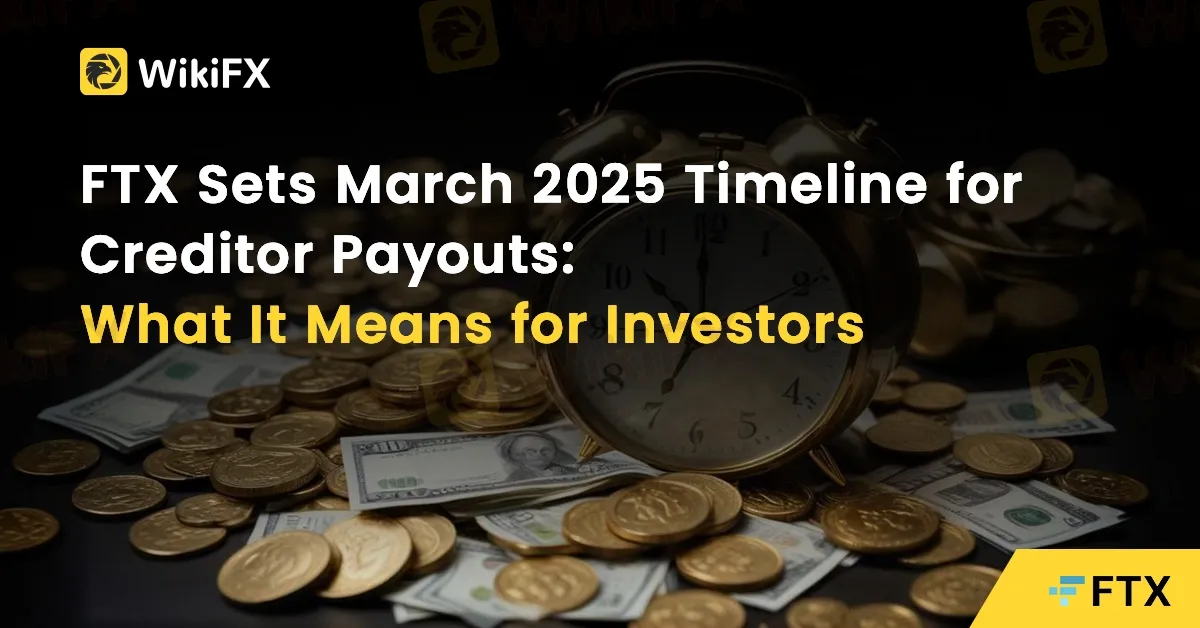简体中文
繁體中文
English
Pусский
日本語
ภาษาไทย
Tiếng Việt
Bahasa Indonesia
Español
हिन्दी
Filippiiniläinen
Français
Deutsch
Português
Türkçe
한국어
العربية
FTX Sets March 2025 Timeline for Creditor Payouts: What It Means for Investors
Abstract:The FTX bankruptcy estate has outlined a timeline for reimbursing creditors and customers, with initial payouts scheduled to begin in March 2025.

The FTX bankruptcy estate has outlined a timeline for reimbursing creditors and customers, with initial payouts scheduled to begin in March 2025. The collapsed cryptocurrency exchange is working to finalise arrangements with distribution agents by December 2024, ensuring the smooth management of the payout process through a dedicated customer portal.
Interim CEO John J. Ray III emphasised the estates commitment to expediting the reimbursement process while maximising recoveries. He stated that efforts are fully underway to reach agreements with distribution agents and return proceeds to affected creditors and customers.
Under the approved reimbursement plan, 98% of creditors are expected to receive at least 118% of their claim value in cash. A significant portion of the creditors, particularly those in the “dotcom customer entitlement claims” category, supported the plan, with 94% voting in favour. This group alone accounts for approximately $6.83 billion in claims.

In October 2024, a U.S. judge approved the reorganisation plan, with Judge Dorsey describing it as a “model case” for handling complex Chapter 11 bankruptcy proceedings. However, some creditors criticised the decision to calculate payouts based on digital asset prices at the time of the bankruptcy petition. For instance, Bitcoin was valued at $16,000 during the petition filing but has since surged to nearly $99,000.
Despite these concerns, legal representatives pointed out that FTX lacked the cryptocurrency reserves required for in-kind distributions. David Adler, a lawyer for some creditors, acknowledged the limitations, noting that cash reimbursements were the only viable option.
Beyond its reimbursement efforts, the FTX bankruptcy estate has been aggressively pursuing legal action against parties implicated in the platform's collapse. Lawsuits have been filed against various exchanges and individuals, including a $50 million claim against KuCoin, an $11 million suit against Crypto.com, and a $100 million case involving Anthony Scaramucci and SkyBridge Capital.
Additionally, Binance and its founder Changpeng Zhao are facing a $1.8 billion lawsuit. The FTX estate alleges that Binance received $1.76 billion in fraudulent transfers prior to FTX's downfall in 2022. These lawsuits aim to recover significant funds to support the estates overall recovery efforts.
While discussions of an “FTX 2.0” platform reboot were initially explored, the idea was ultimately shelved due to a lack of investor interest. The collapse of investor confidence made it impossible to secure the necessary capital for relaunching the exchange.
The saga of FTXs downfall also culminated in the criminal conviction of its former CEO, Sam Bankman-Fried. In November 2023, he was found guilty of fraud and sentenced to 25 years in prison. This development marked a dramatic conclusion to one of the most high-profile failures in the cryptocurrency industry.

Disclaimer:
The views in this article only represent the author's personal views, and do not constitute investment advice on this platform. This platform does not guarantee the accuracy, completeness and timeliness of the information in the article, and will not be liable for any loss caused by the use of or reliance on the information in the article.
Read more

Bybit Shuts Down NFT Marketplace Amid Crypto Market Downturn
Bybit announces the closure of its NFT marketplace, citing efforts to streamline offerings. Discover the latest trends in the declining NFT market and its shift to utility-based growth.

Galaxy Digital Settles $200M in Luna Token Manipulation Case
Galaxy Digital pays $200M to settle Luna token manipulation probe by NY regulators, linked to TerraUSD’s 2022 crash, impacting crypto market stability.

Vanuatu Passes VASP Act to Regulate Crypto and Digital Assets
Vanuatu's new VASP Act regulates crypto businesses, enforcing strict licensing, AML/CFT compliance, and investor protections.

Blockchain Decentralization: Empowering a Trustless Future
In recent years, blockchain technology has rapidly evolved from a niche innovation behind Bitcoin into a transformative force across industries. At its core, blockchain decentralization refers to the distribution of authority and decision-making away from a central entity and into the hands of a distributed network of participants. This shift redefines how data is stored and verified and paves the way for trustless, transparent, and resilient systems that challenge traditional centralized models.
WikiFX Broker
Latest News
Exposing the Top 5 Scam Brokers of March 2025: A Closer Look by WikiFX
Gold Prices Climb Again – Have Investors Seized the Opportunity?
Webull Launches SMSF Investment Platform with Zero Fees
Australian Regulator Warns of Money Laundering and Fraud Risks in Crypto ATMs
The Withdrawal Trap: How Scam Brokers Lure Victims into Paying More
FCA to Investors: Think Twice Before Trusting These Brokers
Trump\s tariffs: How could they affect the UK and your money
Trump gambles it all on global tariffs he\s wanted for decades
TradingView Brings Live Market Charts to Telegram Users with New Mini App
HTFX Spreads Joy During Eid Charity Event in Jakarta
Currency Calculator







